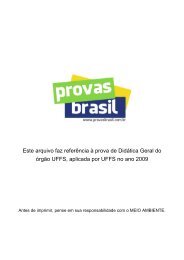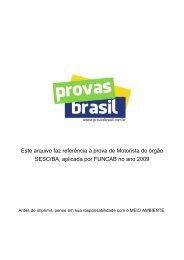Prova Objetiva - va 'E'
Prova Objetiva - va 'E'
Prova Objetiva - va 'E'
Create successful ePaper yourself
Turn your PDF publications into a flip-book with our unique Google optimized e-Paper software.
Este arquivo faz referência à pro<strong>va</strong> de Professor de Inglês do<br />
órgão Prefeitura de Belo Monte/AL, aplicada por CERCON no<br />
ano 2010<br />
Antes de imprimir, pense em sua responsabilidade com o MEIO AMBIENTE.
CONCURSO PÚBLICO MUNICIPAL – PROFESSOR DE INGLÊS<br />
PORTUGUÊS<br />
Baseiam-se no texto a seguir as questões 01 a 04.<br />
A racionalidade comunicati<strong>va</strong> se tornou possível com o advento da<br />
modernidade, que emancipou o homem do jugo da tradição e da autoridade,<br />
e permitiu que ele próprio decidisse, sujeito unicamente à força do melhor<br />
argumento, que proposições são ou não aceitáveis, na tríplice dimensão: da<br />
verdade (mundo objetivo), da justiça (mundo social) e da veracidade (mundo<br />
subjetivo). Ocorre que simultaneamente com a racionalização do mundo<br />
vivido, que permitiu esse aumento de autonomia, a modernidade gerou outro<br />
processo de racionalização, abrangendo a esfera do Estado e da Economia,<br />
que acabou se automatizando do mundo vivido e se incorporou numa esfera<br />
"sistêmica", regida pela razão instrumental. A racionalização sistêmica,<br />
prescindido da coordenação comunicati<strong>va</strong> das ações e impondo aos<br />
indivíduos uma coordenação automática, independente de sua vontade,<br />
produziu uma crescente perda de liberdade.<br />
01. De acordo com o texto, na modernidade:<br />
(A) A racionalização comunicati<strong>va</strong> <strong>va</strong>lorizou o trabalho.<br />
(B) O homem pôde decidir quais seriam os novos <strong>va</strong>lores aceitáveis.<br />
(C) O homem, ao perder a tradição, perdeu a autoridade.<br />
(D) A racionalidade impeliu o homem ao jugo da tradição.<br />
02. A racionalização do mundo vivido permitiu:<br />
(A) a tríplice dimensão da verdade<br />
(B) um aumento da autonomia<br />
(C) a aceitação da autoridade<br />
(D) a <strong>va</strong>lorização do trabalho<br />
03. A modernidade gerou dois processos de racionalização:<br />
(A) a do mundo vivido e a sistêmica<br />
(B) a subjeti<strong>va</strong> e a objeti<strong>va</strong><br />
(C) a instrumental e a da Economia<br />
(D) a da tradição e a da autoridade<br />
04. A racionalização regida pela razão institucional:<br />
(A) é imprescindível para a comunicação humana<br />
(B) impõe aos indivíduos a comunicação das ações<br />
(C) ganhou dimensão maior por causa do Estado<br />
(D) fez decrescer a liberdade<br />
05. Considere o seguinte trecho:<br />
Em vez do médico do Milan, o doutor José Luiz Runco, da<br />
Seleção, é quem deverá ser o responsável pela cirurgia de<br />
Cafu. Foi ele quem operou o volante Edu e o atacante Ricardo<br />
Oliveira, dois jogadores que tiveram problemas semelhantes<br />
no ano passado.<br />
O termo “ele”, em destaque no texto, refere-se:<br />
(A) ao médico do Milan.<br />
(B) a Cafu.<br />
(C) ao doutor José Luiz Runco.<br />
(D) ao volante Edu.<br />
06. Considere o seguinte diálogo:<br />
I. A: Por que você está triste?<br />
II. B: Porque ela me deixou.<br />
III. A: E ela fez isso por quê?<br />
IV. B: Não sei o porquê. Tentei acabar com as causas da crise por que<br />
passá<strong>va</strong>mos.<br />
V. A: Ah! Você se perdeu nos porquês.<br />
Do ponto de vista gramatical, os termos sublinhados estão corretamente<br />
empregados em:<br />
(A) IV somente.<br />
(B) I, III e V somente.<br />
(C) II e IV somente.<br />
(D) I, II, III, IV e V.<br />
07. Considere as seguintes sentenças:<br />
I. Ele sempre falou por meias palavras.<br />
II. É meio-dia e meio.<br />
III. Esta<strong>va</strong> meia nervosa por causa da mãe.<br />
IV. Quero meia maçã para a sobremesa.<br />
V. Ficaram meio revoltados com a situação.<br />
Do ponto de vista da gramática normati<strong>va</strong>, estão corretas as sentenças:<br />
(A) III e IV somente.<br />
(B) II e V somente.<br />
(C) I, II e III somente.<br />
(D) I, IV e V somente.<br />
08. _____________ fábricas _________ produtos são _________ feitos.<br />
Assinale a alternati<strong>va</strong> cujos termos completam as lacunas de acordo<br />
com a norma culta.<br />
(A) Existe, aonde, mal.<br />
(B) Existem, onde, mau.<br />
(C) Há, aonde, mau.<br />
(D) Há, onde, mal.<br />
09. Assinale a alternati<strong>va</strong> que NÃO está de acordo com a norma culta.<br />
(A) Vitamina é bom para o adequado funcionamento do organismo.<br />
(B) É necessária a contribuição de todas as pessoas.<br />
(C) É necessário autorização para entrar na festa.<br />
(D) Embora fossem belos, os moços esta<strong>va</strong>m só.<br />
10. Considere as seguintes previsões astrológicas:<br />
I. Tanto a Lua como Vênus _______ a semana mais propícia a<br />
negociações. (deixar)<br />
II. Calma e tranquilidade _______ em seus relacionamentos.<br />
(ajudar)<br />
III. Discussões, contratempos financeiros, problemas sentimentais,<br />
nada o ________ nesta semana. (atrapalhar)<br />
Assinale a alternati<strong>va</strong> em que os verbos entre parênteses completam<br />
o texto do horóscopo acima de acordo com a norma culta.<br />
(A) deixarão, ajudará, atrapalhará.<br />
(B) deixará, ajudarão, atrapalharão.<br />
(C) deixarão, ajudarão, atrapalharão.<br />
(D) deixarão, ajudarão, atrapalhará.<br />
CONHECIMENTOS GERAIS – EDUCAÇÃO<br />
11. Qual a normartização responsável pela instituição das Diretrizes<br />
Nacionais para a educação de alunos que apresentem necessidades<br />
educacionais especiais, na Educação Básica, em todas as suas etapas<br />
e modalidades?<br />
(A) Lei de Diretrizes e Bases da Educação - Lei 9.394, de 20 de<br />
dezembro de 1996.<br />
(B) Resolução - CNE/CEB Nº 2, de 11 de Fevereiro de 2001.<br />
(C) Lei 9.131, de 25 de novembro de 1995<br />
(D) Resolução CEB nº 2, DE 07 de abril de 1998.<br />
12. Os professores especializados em educação especial deverão compro<strong>va</strong>r:<br />
(A) Formação obrigatória em cursos de licenciatura em educação<br />
especial, preferencialmente de modo concomitante e associado<br />
à licenciatura para educação infantil ou para os anos iniciais da<br />
educação infantil.<br />
(B) Complementação de estudos ou pós-graduação em áreas<br />
específicas da educação especial, posterior à licenciatura nas<br />
diferentes áreas de conhecimento, para atuação nos anos finais<br />
da educação infantil e ensino fundamental.<br />
(C) Complementação de estudos ou pós-graduação em áreas<br />
específicas da educação especial, posterior à licenciatura nas<br />
diferentes áreas de conhecimento, para atuação nos anos finais<br />
do ensino fundamental e no ensino médio.<br />
(D) Formação obrigatória em cursos de bacharelado ou em uma de<br />
suas áreas, preferencialmente de modo concomitante e<br />
associado à licenciatura para educação infantil ou para os anos<br />
iniciais do ensino fundamental.<br />
13. De acordo com os Parâmetros Curriculares Nacionais, em se tratando<br />
de “AUTONOMIA”, assinale a alternati<strong>va</strong> INCORRETA.<br />
(A) A autonomia refere-se à capacidade de posicionar-se, elaborar<br />
projetos pessoais e participar enunciati<strong>va</strong> e cooperati<strong>va</strong>mente<br />
de projetos coletivos, ter discernimento, organizar-se em função<br />
de metas eleitas, governar-se, participar da gestão de ações<br />
coleti<strong>va</strong>s, estabelecer critérios e eleger princípios éticos, etc.<br />
(B) O desenvolvimento da autonomia depende de suportes<br />
materiais, intelectuais e emocionais.<br />
(C) Nos Parâmetros Curriculares Nacionais a autonomia é tomada<br />
ao mesmo tempo como capacidade a ser desenvolvida pelos<br />
alunos e como princípio didático geral, orientador das práticas<br />
pedagógicas.<br />
(D) É importante salientar que a autonomia é um estado psicológico<br />
geral que, uma vez atingido, torna-se garantido para qualquer<br />
situação. Por um lado, por envolver a necessidade de<br />
conhecimentos e condições específicas, uma pessoa pode ter<br />
autonomia para atuar em determinados campos e não em<br />
outros; por outro, por implicar o estabelecimento de relações<br />
democráticas de poder e autoridade é possível que alguém<br />
exerça a capacidade de agir com autonomia em algumas<br />
situações e não noutras, nas quais não pode interferir.<br />
1
CONCURSO PÚBLICO MUNICIPAL – PROFESSOR DE INGLÊS<br />
14. Em se tratando de “INTERAÇÃO E COOPERAÇÃO”, no âmbito dos<br />
Parâmetros Curriculares Nacionais, assinale a alternati<strong>va</strong> INCORRETA.<br />
(A) A criação de um clima favorável a esse aprendizado depende do<br />
compromisso do professor em aceitar contribuições dos alunos<br />
(mesmo quando apresentadas de forma confusa ou incorreta) e em<br />
favorecer o respeito, por parte do grupo, assegurando a<br />
participação de todos os alunos.<br />
(B) Trabalhar em grupo de maneira cooperati<strong>va</strong> é sempre uma tarefa<br />
difícil, mesmo para adultos convencidos de sua necessidade.<br />
(C) Um dos objetivos da educação escolar é que os alunos aprendam<br />
a assumir a palavra enunciada e a conviver em grupo de maneira<br />
produti<strong>va</strong> e cooperada.<br />
(D) A organização dos alunos em grupos de trabalho influencia o<br />
processo de ensino e aprendizagem, e pode ser otimizada quando<br />
o professor não interfere na organização dos grupos.<br />
15. Conforme dispõe o Plano de Desenvolvimento Educacional (PDE),<br />
acerca da “Formação de Professores e Piso Salarial Nacional”, assinale a<br />
alternati<strong>va</strong> INCORRETA.<br />
(A) A Emenda Constitucional nº 53 estabeleceu a obrigação de que lei<br />
federal fixe o piso salarial nacional do magistério, resgatando compromisso<br />
histórico firmado no Palácio do Planalto, em 1994, entre o<br />
Ministério da Educação, o Conselho Nacional de Secretários de<br />
Educação (CONSED), a União Nacional de Dirigentes Municipais<br />
de Educação (UNDIME), a Confederação Nacional dos<br />
Trabalhadores em Educação (CNTE) e outros atores sociais.<br />
(B) Um dos principais pontos do PDE é a formação de professores e a<br />
<strong>va</strong>lorização dos profissionais da educação. A questão é urgente,<br />
estratégica e reclama resposta nacional. Nesse sentido, o PDE<br />
promove o desdobramento de iniciati<strong>va</strong>s fulcrais, quais sejam: a<br />
distinção dada aos profissionais da educação, única categoria<br />
profissional com piso salarial nacional constitucionalmente<br />
assegurado, e o comprometimento definitivo e determinante da<br />
União com a formação de professores para os sistemas públicos<br />
de educação básica (a Universidade Aberta do Brasil – UAB– e o<br />
Programa Institucional de Bolsas de Iniciação à Docência – PIBID).<br />
(C) O Conselho Nacional de Educação foi responsável pela alteração<br />
do quadro de formação de professores que passou a estabelecer<br />
relação permanente entre educação superior e educação básica,<br />
ino<strong>va</strong>ção que foi o início de um futuro sistema nacional público de<br />
formação de professores, no qual a União, por meio da Fundação<br />
Coordenação de Aperfeiçoamento de Pessoal de Nível Superior<br />
(CAPES), de fato passe a assumir uma responsabilidade que, a<br />
rigor, sempre foi sua.<br />
(D) As universidades públicas, da sua parte, oferecem cursos de<br />
licenciatura e especialização, especialmente onde não exista oferta<br />
de cursos presenciais. Quando instalados os pólos previstos, todos<br />
os professores poderão se associar a um centro de formação nas<br />
proximidades do trabalho.<br />
16. No contexto do Plano de Desenvolvimento Educacional, a educação<br />
superior baliza-se pelos seguintes princípios complementares, EXCETO:<br />
(A) Promoção de inclusão social pela educação, trabalho e cidadania,<br />
minorando nosso histórico de desperdício de talentos,<br />
considerando que não dispomos compro<strong>va</strong>damente de significativo<br />
contingente de jovens competentes e criativos que têm sido<br />
sistematicamente excluídos por um filtro de natureza econômica.<br />
(B) Garantia de qualidade.<br />
(C) Expansão da oferta de <strong>va</strong>gas, dado ser inaceitável que somente<br />
11% de jovens, entre 18 e 24 anos, tenham acesso a esse nível<br />
educacional.<br />
(D) Desenvolvimento econômico e social, fazendo da educação<br />
superior, seja enquanto formadora de recursos humanos altamente<br />
qualificados, seja como peça imprescindível na produção científicotecnológica,<br />
elemento-chave da integração e da formação da<br />
Nação.<br />
CONHECIMENTOS ESPECÍFICOS<br />
Answer questions 17 to 27 by referring to the magazine article about<br />
careers.<br />
PEOPLE AT WORK<br />
A Name: Adrian Bohane<br />
Occupation: Sales director of a company selling satellite imagery<br />
I usually work in the mornings and afternoons but because the<br />
company headquarters are based in Canada, I often have to turn on my<br />
personal computer as soon as I get home from the office to check for e-mails.<br />
This means about three hours more work after I should have finished for the<br />
day. My main job is to look after thirty distributors in my area so I spend<br />
most of my day making contact with them. I often attend conferences on<br />
satellite data and also do presentations to explain to clients about the<br />
industry. Most clients come from an academic background as satellite data<br />
is often used for scientific reasons.<br />
The high point of the job has to be the excellent opportunity I have<br />
to travel and it is great to mix with people from so many nationalities.<br />
Conversely, traveling can sometimes be a low as I am never at home and<br />
it involves working on my own a great deal of the time.<br />
Sometimes it is difficult to remain connected and know exactly<br />
what is going on at head office. However, at the end of the day I am my<br />
own boss – which is nice – so I only really have to worry about me.<br />
In my free time I like to travel and go diving, but as I am so busy<br />
with work there is very little time for any of this. What little time I do have<br />
off is spent relaxing with friends, eating out or working in the garden.<br />
B Name: Victoria Williamson<br />
Occupation: PA in an all – girl pop band<br />
I was actually part of the girls’ management team for two months,<br />
before they asked me to be their PA. If we’re in America, I get up at 6:00<br />
am to stay in touch with London – getting up so early can be really difficult!<br />
– But in Europe, I get up around 9:30 am. I go to the hotel gym, make sure<br />
everyone’s UP, check in with security and confirm the day’s appointments<br />
and interviews. I’m the link between the girls and the record company,<br />
stylists, accountants and print media. Now that they manage themselves,<br />
there’s also a lot of legal paperwork to be signed and returned quickly.<br />
I’m working all the time that I’m awake. I don’t have breaks as<br />
such, and I’m often up until 2 a.m. But because the girls have such a great<br />
sense of humor and fun, it’s always a real laugh. And at times we can get<br />
really emotional together. Working for women is fantastic because they’re<br />
much more on my wavelength than any of the male bosses I’ve had.<br />
C Name: Dr. Heather Hall<br />
Occupation: Assistant curator at a major zoo<br />
I arrive at the zoo at about 7:45 am, and catch up on what’s<br />
happening in the aquarium and reptile house. If I have time before my<br />
department meetings, I walk around each section and talk to the keepers<br />
about any problems that may have come up.<br />
I oversee about 2,000 animals, and we are constantly reviewing<br />
which animals we want to keep. If we’re left with just one individual animal<br />
from a particular species, we try to send it to join a breeding programme at<br />
another zoo. After lunch – usually something to eat at my desk – I open my<br />
post, which includes letters and questionnaires from students and other<br />
zoos, which I respond to. My afternoon work is likely to be more diverse. I<br />
work closely with a group of scientists at the Institute of Zoology, working<br />
on population and species management. I show visitors from other zoos<br />
and institutes around, talking them though the set-up. I also give lectures<br />
to students, anglers, fish hobbyists and members of the public. I finish<br />
work at 6 p.m., when somebody else takes over, and if I sometimes spend<br />
evenings at home, catching up on reading or research, that’s really for my<br />
own interest.<br />
D Name: Hannah Latham<br />
Occupation: Motorcycle courier<br />
I do about fifteen to twenty-five pick-ups a day. I mainly pick-up and<br />
deliver small packets - that’s all fairly standard, but sometimes I take<br />
passports to embassies, wait for visas to be issued, or pay checks into<br />
banks. Some of the requests can be quite strange: I once had to deliver 20<br />
cream cheese bagels to a café! A lot of my work is in inner London, so I<br />
have to be really careful, especially in wet weather. The job takes a lot of<br />
concentration,<br />
and I occasionally get angry with drivers, but I have to control my road<br />
rage as it impairs my riding. I used to get lost quite a bit at first, but it didn’t<br />
take long to develop my map-reading skills.<br />
I do feel really satisfied when I’ve had a good day, and I don’t seem<br />
to have any problems switching off in the evening. I used to work<br />
Saturdays, too, but now my weekends are completely taken up with<br />
motorcycle racing, which is my new passion.<br />
(Resource – CEAPT by Nick Kenny and Peter Sunderland)<br />
2
CONCURSO PÚBLICO MUNICIPAL – PROFESSOR DE INGLÊS<br />
Now, according to the article, which person…<br />
17. Feels great empathy with his/her employers?<br />
(A) Adrian Bohane<br />
(B) Victoria Williamson<br />
(C) Dr. Heather Hall<br />
(D) Hannah Latham<br />
18. Encountered difficulties with the job initially?<br />
(A) Adrian Bohane<br />
(B) Victoria Williamson<br />
(C) Dr. Heather Hall<br />
(D) Hannah Latham<br />
19. Liaises with an academic body?<br />
(A) Adrian Bohane<br />
(B) Victoria Williamson<br />
(C) Dr. Heather Hall<br />
(D) Hannah Latham<br />
20. Routinely works beyond the stipulated hours?<br />
(A) Adrian Bohane<br />
(B) Victoria Williamson<br />
(C) Dr. Heather Hall<br />
(D) Hannah Latham<br />
21. Liaises between his/her clients and other professionals?<br />
(A) Adrian Bohane<br />
(B) Victoria Williamson<br />
(C) Dr. Heather Hall<br />
(D) Hannah Latham<br />
22. Can no longer offer complete flexibility of working hours?<br />
(A) Adrian Bohane<br />
(B) Victoria Williamson<br />
(C) Dr. Heather Hall<br />
(D) Hannah Latham<br />
23. Informs people how his/her organization works?<br />
(A) Adrian Bohane<br />
(B) Victoria Williamson<br />
(C) Dr. Heather Hall<br />
(D) Hannah Latham<br />
24. Sometimes looses track of what is happening elsewhere in his/her<br />
organization?<br />
(A) Adrian Bohane<br />
(B) Victoria Williamson<br />
(C) Dr. Heather Hall<br />
(D) Hannah Latham<br />
25. Has to hold his/her emotion in check?<br />
(A) Adrian Bohane<br />
(B) Victoria Williamson<br />
(C) Dr. Heather Hall<br />
(D) Hannah Latham<br />
26. Is co-operative with organizations similar to his/her own?<br />
(A) Adrian Bohane<br />
(B) Victoria Williamson<br />
(C) Dr. Heather Hall<br />
(D) Hannah Latham<br />
27. Regards the main part of his/her job as routine?<br />
(A) Adrian Bohane<br />
(B) Victoria Williamson<br />
(C) Dr. Heather Hall<br />
(D) Hannah Latham<br />
Rock Journalism<br />
Back in the 1960s, when rock music journalism was in its infancy,<br />
great pieces of writing stood head and shoulders above the rest. These days<br />
it has become so commonplace, so everyday, that true opinion, true<br />
experience and true style have become difficult to find. Reading a lot of rock<br />
writing nowadays you start to wonder why the people involved picked up a<br />
pen in the firs place.<br />
These days the rock’n’roll lifestyle has become a cliché. In fact the<br />
myth of Beatledom (a lifetime squeezed into ten short years) is now so<br />
well-known, so much apart of modern history, that it can be emulated (at<br />
least in theory) by fledgling rock stars from places as far apart as St<br />
Petersburg and Auckland. Back in the days when Rod Stewart wanted to<br />
be a rock star he was more or less escaping the drudgery of the production<br />
line; these days his job comes with a pension plan. It’s not surprising that<br />
rock journalism has become a cliché too.<br />
(Resource: UNIVERSITY OF CAMBRIDGE)<br />
28. The writer says that, compared with the 1960s, rock journalism today<br />
(A) annoys many readers.<br />
(B) confuses many readers.<br />
(C) is seldom critical.<br />
(D) is mostly unremarkable .<br />
29. The writer uses Rod Stewart as an example of a rock star<br />
(A) who has remained popular for a long time.<br />
(B) whose motives for becoming one are no longer common.<br />
(C) who is typical of many rock star today.<br />
(D) about whom the same kind of things are always written.<br />
Book Review<br />
Mozart’s letters; edited and translated by Robert Spaethling<br />
Like many 18 th and 19 th century composers, Wolfgang Amadé<br />
Mozart spent a large part of his life on the road. During this time, he<br />
impulsively poured his unexpurgated thoughts into copious letters home.<br />
These are of crucial biographical importance, but their translation is<br />
problematic. Mozart had no formal education and wrote in a mixture of<br />
German, French and Italian. His grammar and spelling were unruly and his<br />
literary efforts idiosyncratic in the highest degree. Although the words<br />
themselves are easily decoded with the help of bilingual dictionaries, the<br />
real problem lies in the tone and, as Robert Spaethling observes, previous<br />
translators have ducked this. He points to the inappropriateness of reading<br />
the letters in impeccable grammar, and aims rather to preserve the natural<br />
flow and flavor of Mozart’s original style.<br />
Spaethling clearly loves words, and linguistic nuance, as much as<br />
Mozart did himself. And when the linguistic games are at their most<br />
complex, he democratically prints the original alongside the translation so<br />
that we can quarrel and do better. The beauty of this work is that now we<br />
can see how – causally and seemingly without truing - Mozart parodies the<br />
epistolary modes of the day. And it’s possible to see a connection between<br />
this freewheeling brilliance with words and his prodigious musical abilities.<br />
(Resource: UNIVERSITY OF CAMBRIDGE)<br />
30. Which phrase from the text confirms the idea that Mozart intended his<br />
letters to be amusing?<br />
(A) impulsively poured.<br />
(B) Idiosyncratic in the highest degree<br />
(C) Natural flow and flavor<br />
(D) Parodies the epistolary modes<br />
31. Which of the following best summarizes the reviewer’s opinion of the<br />
new translation?<br />
(A) It reveals previously neglected facts about Mozart.<br />
(B) It throws further light on Mozart’s genius<br />
(C) It allows a reinterpretation of Mozart’s music<br />
(D) It underlines the need for further research about Mozart.<br />
32. Choose the best option to match the examples of vocabulary with the<br />
categories.<br />
Examples of vocabulary<br />
1. impossible – unhappy – disad<strong>va</strong>ntage – rename<br />
2. hard work – a heavy subject - a great idea<br />
3. wonderful – marvelous – brilliant – great<br />
4. longest – director – wooden – slowly<br />
5. Oranges – apples – mangoes – bananas<br />
Categories<br />
A- Synonyms<br />
B- Collocations<br />
C- Compound words<br />
D- Lexical set<br />
E- Words with suffixes<br />
F- Words with prefixes<br />
(A) 1F – 2B – 3A – 4E – 5D<br />
(B) 1F – 2C – 3A– 4E – 5B<br />
(C) 1F – 2D – 3C – 4A – 5B<br />
(D) 1D – 2E – 3A – 4B – 5F<br />
3

















